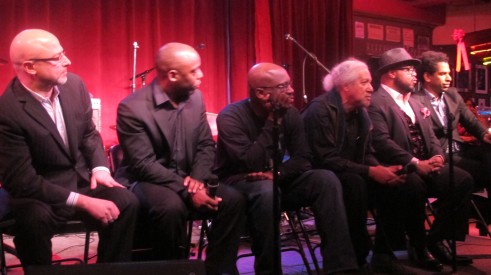After what has been wholly acknowledged as one of the most enthralling arts and culture debates of 2011, the Nicholas Payton-inspired firestorm over a post on the trumpeter’s own blog, which challenged the use of the word “jazz” has begun to marinate in its concept and mellow in terms of its seemingly incendiary intention, evidenced by last night’s first #BAM (Black American Music) conference, held at Birdland jazz club in midtown. Defenses were down and ears were wide open, as Payton led a panel discussion which included pianist Orrin Evans, saxophonist Marcus Strickland, bassist Ben Wolfe and veteran altoist ,Gary Bartz, who has been a long-time advocate of dumping the “j-word”, as jazz was relentlessly referred throughout the evening. Befittingly moderated by Touré, music journalist, cultural critic, and author of the provocative Who’s Afraid of Post Blackness: What It Means To Be Black Now, the conversation took a hiatus from the social network cosmos, challenging cynics who may have thought this argument would be fleeting at best and fall on its face at worst. “Just the fact that we’re all here about a word speaks of the issue that has been lurking underneath the surface for a long time,” said Payton. “This is not a new argument; this is an argument that has been had for many, many, many years. It’s just that now I feel we’re in a position to actually do something about it.”
Indeed the likes of Charles Mingus, Max Roach, and Miles Davis precede Payton and panel, when it comes to the aversion to the demeaning racial connotations the term “jazz” holds. Vince Wilburn Jr., nephew to Miles Davis, echoed his uncle’s sentiments from the audience, which also included pianist Geri Allen, author and professor Farah Jasmine Griffin, and journalist Stanley Crouch, to name a few illustrious figures who came to hear from Payton face to face.
Understanding the concept of disowning this term has been challenging on many fronts, even among fellow musicians, and many are wondering what relabeling the genre to one so broad-sounding as Black American Music can do in terms of marketing and selling product, as well as revivifying the music and its potential audience. Others are concerned that labeling the music by race will have exclusionary consequences. “When you study the music it becomes quite clear that it is Black American music,” Wolfe contends. “And my question is, why is that an issue? That’s a beautiful thing…for everybody.” Payton underscored, questioning why no one challenges such undeniable cultural ties between Mexican people and Mariachi, or Polka and eastern Europeans, for example.
“No one is here on this panel because we’re talking about our career. This is about something I believe in,” says Evans addressing the afore mentioned concern. He argues instead that as artists taking such an anti-establishment stance, they have the most at stake. “I thought my house was going to be firebombed,” he joked, referring to his allegiance to the ever-controversial Payton. “So I don’t think anybody is out here to advance their career.”
The musicians on this panel may not be thinking career advancement per se, but there are many who are concerned with protecting theirs. Yet as jazz struggles through an incredible identity crisis, and very low overall marketshare (some 3% of all music sales, last I checked), one has to wonder what’s to lose. Outside of the term “jazz” having such deep racial connotations, it sets no clear musical indication, anyways. Jazz can be anything from Louis Armstrong to Kenny G…from Branford Marsalis to Mary J. Blige, depending on your location (the club or the cruise ship). So, while we don’t know what will come of the #BAM movement, and there are definitely some kinks to be worked out, it certainly has everyone’s attention (Payton’s recent posts have garnered upwards of 70,000 views and counting). That’s something we haven’t been able to say for “jazz” in quite some time. “We’re trying to find a more suitable label for this great music that is, for the most part, identified by a very, very arbitrary and disdainful word,” said Strickland. “That’s what we’re here for.” ♦
Nicholas Payton plays Birdland through Sunday, January 8.
